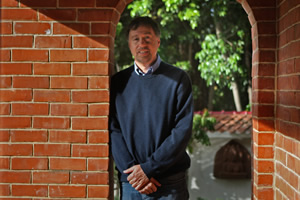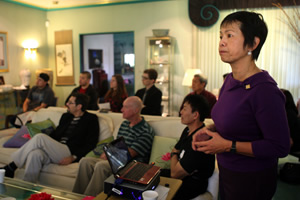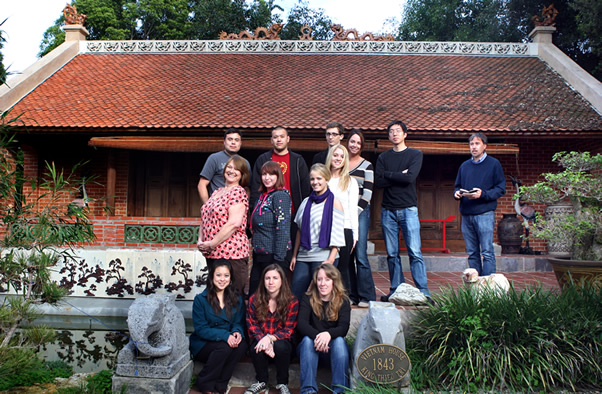Today … in the Mekong Delta
Titans Practice Reporting Skills in Vietnam
March 9, 2010
By Valerie Orleans
Most class assignments don’t require a passport … or immunizations. But most classes at Cal State Fullerton don’t meet in the Mekong Delta region of Vietnam, either.

Jeffrey Brody, professor of communications, will be leading a class through a 10-day visit to Vietnam where students will follow and report on the culture and people of the country, as well as the activities of medical professionals from Project Vietnam Foundation. Photo by Karen Tapia
In early March, 14 Cal State Fullerton students traveled to Vietnam with Jeff Brody, professor of communications, to learn, firsthand, about the culture and people of Vietnam. Traveling with a medical mission sponsored by the Project Vietnam Foundation, these communications majors will spend about ten days reporting on the work of the medical professionals, as well as working on stories about the Vietnamese people, their history and their culture.
As part of his course, “Reporting About Minority Affairs,” Brody has previously taken his students to the Mexican border, African American churches, Little Saigon and other ethnic neighborhoods.
“To report on minority populations, you have to understand them,” said Brody, a former Orange County Register reporter who often focused on Little Saigon during his reporting days. “Once you can empathize with people and understand their culture, you can do a much better job of reporting.
“What drives me crazy is that reporters often focus on food, festivals or crime when writing about people of color,” he said. “Clearly, there is much more than that. My goal is to help students understand how to report and how to get the best stories.”
“I am really looking forward to this new experience,” said senior Anna Gleason, who lives in Rancho Santa Margarita. “This will be a great opportunity for me to learn how to gather information and learn about a culture so different than my own. My hope is that if I find myself in a situation that is unfamiliar or uncomfortable, I’ll be able to act professionally.”

Quyen Kieu, head of the Project Vietnam Foundation, addresses students and professionals during a briefing about this month's trip to Vietnam. Photo by Karen Tapia.
To that end, Brody has spent time teaching the class about the Vietnamese culture, war, history and the geography of the country itself.
Taking a group to Vietnam is a first for Brody (who has visited the country four times on his own).
“I was inspired by programs that other universities offered to their journalism students and I wanted our students to have the same opportunities,” he said, noting that he turned the university's Instructionally-Related Activities grants and received $14,000. The Project Vietnam Foundation provided a stipend of $525 per student and each student had to come up with $500 of their own money to help cover the costs of airfare, ground transportation, visas and lodging/meals.
Learning First-Hand
While in the Mekong Delta, students will not only report on the work of the medical team but also assist whenever possible.
“I want them to see how you set up a clinic in a rural area, how the surgical teams work, how the dentists do their work,” Brody said. “I also want them to participate so they develop empathy and compassion. Then I want them to report on what’s happening.”
“I am looking forward to working with the medical team and getting some good footage for the school website,” said Becky Schroeder of Sherman Oaks. “This trip is a once-in-a-lifetime opportunity.”
Since many of his students have expressed a desire to be foreign correspondents, Brody is eager to see how they will handle reporting responsibilities in a country that is very different from America.
The goal is for students to produce stories on a daily basis.
“They’ll be working in teams,” Brody explained. “There will be a writer, a photographer, a videographer. The idea is to develop packages that can be used for print or video. I hope to see the students produce podcasts, slide shows with audio, broadcast packages, photos and print stories.”
Although Katarina Hong, a communications major from Chino Hills, has traveled to neighboring countries, she has never been to Asia. She hopes to gain international experience and add to her growing collection of demo reels. “Being able to travel overseas and report on a different culture is incredible,” she said. “It’s a much better than reading a book. You get to experience it.”
Brody envisions stories not only on the medical team but also on village life, entrepreneurship, the area's environment, geography of the Mekong Delta and more. “I want the students to uncover the stories that are not often reported in the media,” he said. “It will help make them better journalists.”
“In his state of the university address some years ago, President Milton A. Gordon said he would like every student to have a study abroad experience,” said Tony Fellow, chair and professor of communications. “We took what he had to say seriously. Today, we have one of the largest summer study abroad programs in Italy and just established a student exchange program with a South Korean university where we have two students studying this semester. We will soon propose an intersession study abroad program in France. And we are likely to see another program in Austria. This Vietnam project continues our international efforts, and it appears the students and doctors are doing great things there.”


